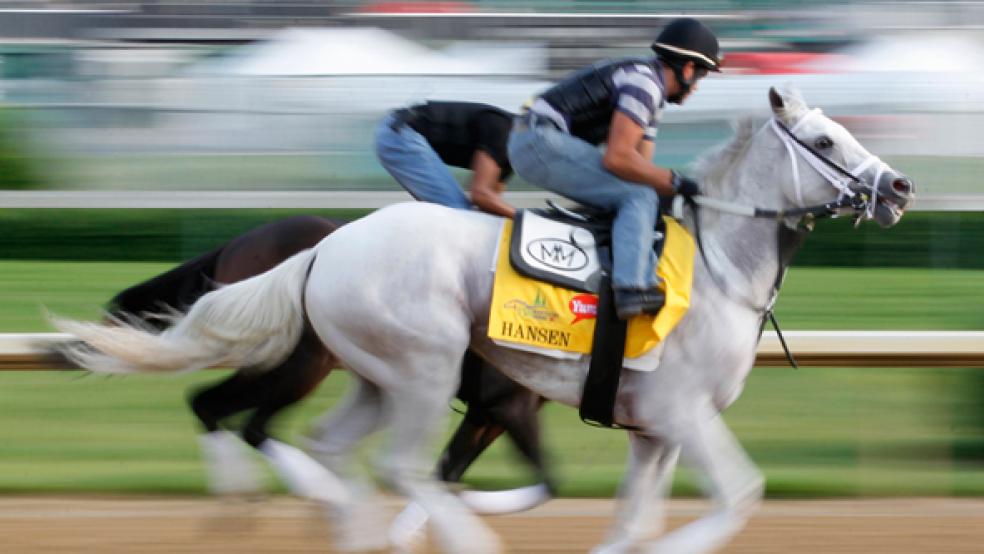Creative Cause. Rousing Sermon. Done Talking.
No, these aren’t the names of fringe political parties. They’re the names of three of the 20 horses racing for the roses in the 138th Kentucky Derby, to be run at Churchill Downs on Saturday. Race time: 4 p.m.
The Kentucky Derby has rightfully been called the greatest two minutes in sports, a mere snapshot of America’s oldest sport. In 1956, however, another American original, the writer John Steinbeck, tried to quantify this annual Calvary charge in the lyrical language it deserved.
"During Derby Week, Louisville is the capital of the world," he wrote. "The Kentucky Derby, whatever it is — a race, an emotion, a turbulence, an explosion — is one of the most beautiful and violent and satisfying things I have ever experienced."
By the numbers, the Derby takes place on an even grander scale. Its economic impact on this old river city and its environs is at least $217.8 million, according to a study by Wilkerson & Associates in 2001, the last year the study was done. That’s a number economists say has doubled over the past ten years.
In 2010, a crowd of 155, 804 was on hand, despite inclement weather early on, and total wagering from all sources, including on-track and off-track betting, was $112.7 million, a 7.8 percent increase from 2009.
RELATED: 4 Oddball Investment Ideas That Can Make You Money
Then there was 2011. A record crowd of 164,858 came to see Animal Kingdom, the first Derby winner to have never previously raced on a dirt track. It was only the second time that Churchill Downs hit the 160,000 attendance mark (the previous record crowd was 163,628 in 1974, the race's 100th anniversary year).
This year, fans should be betting somewhere north of $100 million and drinking untold amounts of beer and mint juleps. Some 15 million people are expected to watch the race on NBC. The network, all told, will present more than 14 hours of Derby coverage, which began earlier this week and ends after the 4 p.m. race on Saturday, May 5.
It costs NBC about $7 million annually for the broadcast rights to the race, a deal that’s been renewed through 2015. In 2009 16.3 million viewers watched the tiny gelding, Mine That Bird, romp home first to capture the blanket of roses, while in 2010 the audience was even higher: Some 16.5 million people watched Super Saver take first in a mud-strewn race (both winning horses were ridden by the same jockey, Calvin Borel). In 2011, the race was the most watched Kentucky Derby since 1989, according to Nielsen data.
More than $127 million was paid out to those holding winning tickets for Mine That Bird. There weren’t many of them: The gelding went off at stratospheric odds of 50-1, which meant he paid $103.20 for a mere $2 bet. Super Saver went off at odds of 8-1 and paid $18 for a $2 win ticket.
RELATED: LA Dodgers Sale: $1B Payday for a Baseball Bandit
How about if you own the horse that won the Derby: How much is that worth?
Here's one example: Big Brown, the 2008 winner, was syndicated for stallion duty north of $30 million. In 2010, he was commanding $55,000 per mating (which perhaps really is the greatest two minutes in sports — or at least among the most lucrative). He covers more than 100 mares a year. You do the math.
As for the rest of us, we need sustenance to spend a whole day gambling with both hands. In 2009 alone, 142,000 hot dogs, 18,000 barbecue sandwiches and 1,892 sheets of Derby pie were consumed. Best of all, Churchill Downs needed 7,800 liters of bourbon to serve 120,000 Mint Juleps.
But if looking natty is your thing, make a stop this year at the Kentucky Derby Museum gift shop and check out the fedoras for sale. The genuine Panama hats are hand-woven in Ecuador, finished in the U.S., and capped off with a feather. The top price in 2012 for viewing the Derby in such style: $250.
This isn’t exactly Steinbeckian … But as they have been saying down here in Louisville for 138 years: Happy Derby!
This is an update of an earlier piece by Joe Drape that appeared in The Fiscal Times.



